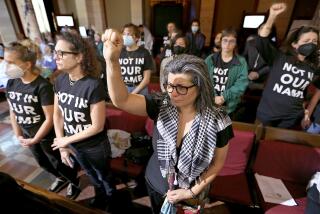World’s Mayors Ask Solidarity Against A-War
- Share via
HIROSHIMA, Japan — Mayors from 23 countries gathered today near the site of the world’s first atomic bomb attack 40 years ago and called for “inter-city solidarity” to prevent nuclear war.
“The atomic bomb that in a flash reduced this city to rubble at 8:15 in the morning, 40 years ago tomorrow, transformed Hiroshima into not merely a place, but a symbol,” said Soedjatmoko, president of the Tokyo-based United Nations University.
The mayors, from 64 cities, opened a weeklong First World Conference of Mayors about half a mile from Hiroshima’s ground zero, where the first U.S. nuclear bomb hit.
The site is now a park filled with monuments to the death and to the destruction the bomb caused.
‘Multiplication of Horror’
“Hiroshima and Nagasaki of all places on earth can tell us what mutual assured destruction (one theory of deterrence) really means: the multiplication of horror beyond our minds’ ability to comprehend--until we come here,” Soedjatmoko said.
Estimates of those who died in Hiroshima from the bomb, called “Little Boy,” range up to 140,000. Three days later, on Aug. 9, 1945, 70,000 more people were killed when the “Fat Man” bomb hit Nagasaki. Japan surrendered on Aug. 14 and World War II ended.
Alfonso Garcia Robles, the Mexican ambassador to the U.N. Disarmament Commission, told the 134 delegates: “It is safe to conclude that the existing nuclear arsenals could annihilate some 240 billion human beings--in other words, a figure 60 times larger than the total population of the planet.”
He praised Moscow’s proposal of one week ago to stop all nuclear testing for five months beginning Tuesday, and he welcomed a U.S. invitation for the Soviet Union to attend an American nuclear test.
Garcia suggested “reciprocal acceptance of their respective proposals.”
More to Read
Sign up for Essential California
The most important California stories and recommendations in your inbox every morning.
You may occasionally receive promotional content from the Los Angeles Times.













